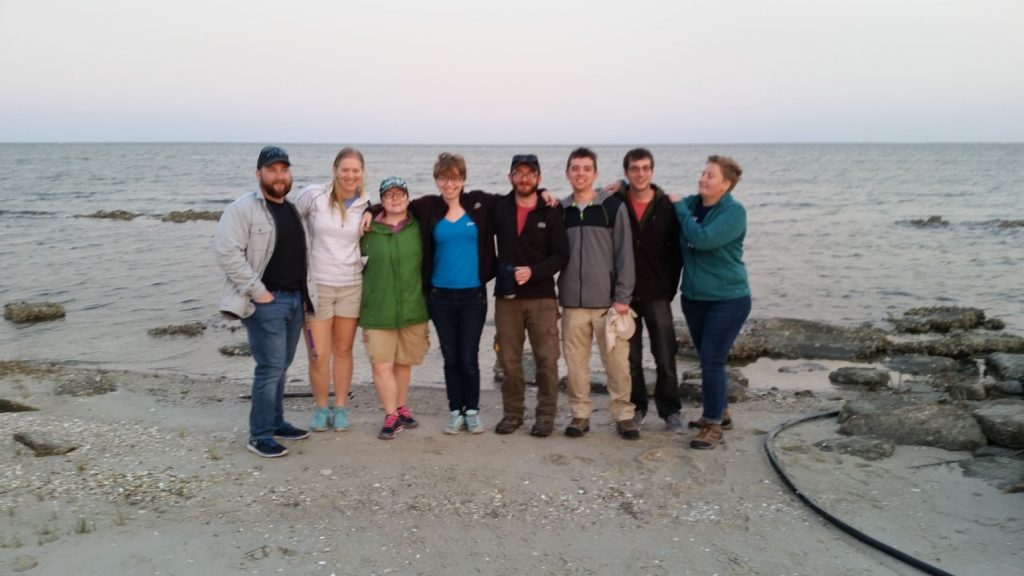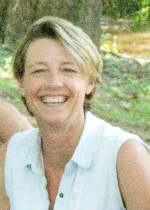 FACULTY AND STAFF
FACULTY AND STAFF
Lynn Harris (PhD University of South Carolina) has a background in nautical archaeology, terrestrial archaeology, submerged cultural resource management and maritime history. Areas of fieldwork experience and research interest include the American South, Africa, and the Caribbean. Her particular interest is the African diaspora and labor history. She teaches courses in underwater archaeology methods, maritime material culture, watercraft recording, and European maritime history with an inter-disciplinary Atlantic World perspective. Teaching assignments have included offering summer abroad study programs in Africa. Harris has also directed and co-directed underwater archaeology field schools for graduate students in a variety of locations. She has published on vernacular watercraft, colonial period shipwrecks, public outreach, maritime heritage tourism, and international collaboration in underwater archaeology initiatives. Most recently, she authored and co-authored articles and reviews in the Journal of Maritime Archaeology, Nautical Research Journal, Historical Archaeology, Journal of Anthropological Research, International Journal of Heritage Studies, Nautilus: A Maritime Journal of Literature, History, and Culture and Northern Mariner. In 2013 she was presented with the Gerald E. Morris Prize by the Fellows of the G. W. Blunt White Library, Mystic Seaport for an article best representing Maritime scholarship. Harris currently serves as faculty in the Program in Maritime Studies, Atlantic World Program, Coastal Resources Management Program, and on the board of the international professional organization Advisory Council for Underwater Archaeology. In 2014 she received an internal East Carolina University Interdisciplinary grant.
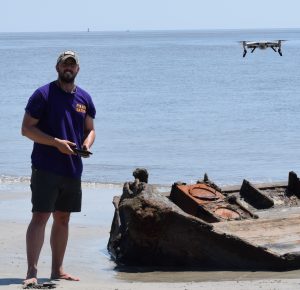
Jeremy Borrelli is the Assistant Staff Maritime Archaeologist for the Program in Maritime Studies. He has experience in terrestrial and maritime archaeology, maritime history and artifact conservation. Over the past eight years Jeremy has been involved with archaeological projects in North Carolina, New York’s Hudson Valley, the Great Lakes, Africa and the Caribbean. Before joining ECU, he worked as an archaeologist for the Queen Anne’s Revenge Shipwreck Project at the QAR Conservation Laboratory and NC Underwater Archaeology Branch. His research interests include 18th and 19th century maritime history, the archaeology of landing sites and harbor infrastructure, practical digital and 3D documentation methods, public archaeology and material culture analysis.
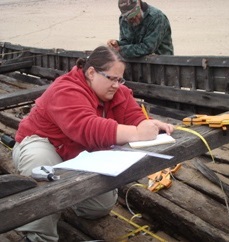 Jennifer Jones grew up in the foothills of the Appalachians but has always had a soft spot for the coast. With a background in archaeology and religious studies, she focused on grave iconography at St. Andrew’s Cathedral, where she fell in love with the Scottish coastline and maritime archaeology. She discovered the Maritime Studies Program at ECU in 2008, where she looked at socioeconomic and archaeological patterns of historic hurricanes along North Carolina’s coast. The Maritime Program was an excellent springboard into the CRM Program where Jennifer completed her dissertation with an interdisciplinary studying maritime cultural resources. Jennifer is a adjunct instructor in the History Department teaching Approaches to Historic Objects and offers a seminar in Coastal Geography for the Geography Department. She has also participated in terrestrial and maritime projects in North Carolina, Georgia, Tennessee, South Carolina, Sweden and Namibia. Her professional interests also include GIS and maritime archaeology in the media.
Jennifer Jones grew up in the foothills of the Appalachians but has always had a soft spot for the coast. With a background in archaeology and religious studies, she focused on grave iconography at St. Andrew’s Cathedral, where she fell in love with the Scottish coastline and maritime archaeology. She discovered the Maritime Studies Program at ECU in 2008, where she looked at socioeconomic and archaeological patterns of historic hurricanes along North Carolina’s coast. The Maritime Program was an excellent springboard into the CRM Program where Jennifer completed her dissertation with an interdisciplinary studying maritime cultural resources. Jennifer is a adjunct instructor in the History Department teaching Approaches to Historic Objects and offers a seminar in Coastal Geography for the Geography Department. She has also participated in terrestrial and maritime projects in North Carolina, Georgia, Tennessee, South Carolina, Sweden and Namibia. Her professional interests also include GIS and maritime archaeology in the media.
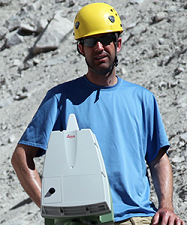
Thad Wasklewicz is a geomorphologist with more than 15 years of experience in academia and 20 plus years as a researcher. Thad was Educated at Plymouth State University (B.S.) and Arizona State University (M.A. and Ph.D.). Since leaving ASU, he has held faculty positions at Texas A&M University (visiting), Colgate University (visiting), and the University of Memphis. Thad is currently an Associate Professor of Geography at East Carolina University. His research focuses on headwater streams (steep channels), alluvial fans, and debris flows. Common research themes include: complex responses, connectivity, geomorphic change detection, and environmental change. Specialties include: Coupled Hillslope-Channel Processes and Forms, Geographic Information Science, and Application of Laser Scanning and GPS Surveying/Mapping Techniques to Geomorphology.
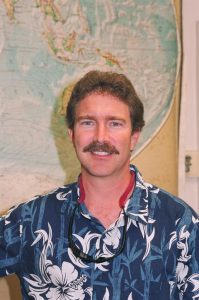
David Mallinson is a geologist is an Associate Professor at East Carolina University specialized in Marine Geology. He received his BS (1984) and MS at East Carolina University (1988) and PhD at University of South Florida (1995). His research and courses cover coastal processes and response to sea-level rise; quaternary geology and climate change, geophysics and sedimentology. David has worked on major research projects to study changes to barrier island, estuarine morphologies and processes (tides, currents, salinity).
STUDENTS
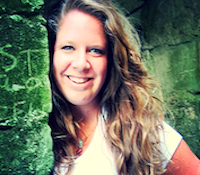
Kelsey Dwyer is a Masters Candidate in the Maritime Studies Program at East Carolina University. Her area of study centers on the application of gender to slave artifacts within the maritime landscape of the Caribbean and Southern United States. Her interest in underwater archaeology was discovered with her first dive certification at a young age. Now, she is AAUS certified and a dive master. She graduated with her Bachelors degrees in Anthropology, Hispanic Studies, and a concentration in Archaeology from Davidson College in Davidson, North Carolina. Throughout her studies, she has worked on projects in Italy, Spain, Ireland, Costa Rica, Nicaragua, Croatia, and throughout the United States. Outside of academia, Kelsey is an animal advocate, classically trained pianist, and enjoys the outdoors.
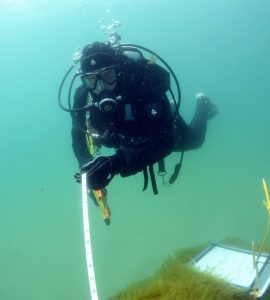
Katherine (Katie) Clevenger is a Master’s candidate in the Program in Maritime Studies at East Carolina University. After receiving bachelor’s degrees in Anthropology and History from Louisiana State University, she took a year off from school to participate in underwater archaeology projects in Spain and Italy. While attending ECU, she has worked on projects in Costa Rica, Florida, Wisconsin, and Michigan. Katie is AAUS certified and a PADI Divemaster. Her main research focuses on photogrammetry, conversion of digital 3D models into detailed 2D site plans, low cost alternatives for digitally recording shipwrecks, and shipwreck management. Katie enjoys fishing, hunting, kayaking, and hiking as frequently as possible.
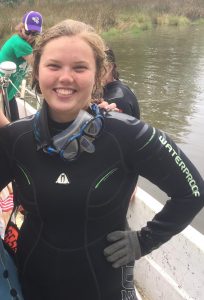
Elise Carroll was born and raised in Greenville, NC. She became interested in Maritime Archaeology after she was SCUBA certified in high school and volunteered for two summers at the Queen Anne’s Revenge Conservation Lab. She returned to Greenville for graduate school after studying History and Anthropology at the University of Mississippi. Presently, she is a student in East Carolina University’s Program in Maritime Studies and an assistant conservator at the QAR Lab. Elise has participated in ECU field projects in Costa Rica, North Carolina, and Florida. She is AAUS certified and a PADI Divemaster. Her thesis is focused on analyzing the management styles used on Civil War and World War II wrecks containing human remains.
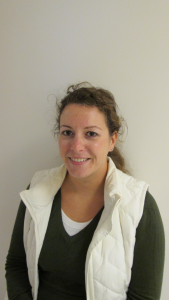
Lauren Christian hails from Halifax, Nova Scotia, Canada. She is currently a Masters candidate at East Carolina University in the Program of Maritime Studies. Her thesis research involves an interdisciplinary study on the historic preservation of three North Carolina lighthouses including historic, historic preservation, and ethnographic approaches. This study looks at the Currituck Beach, Cape Hatteras, and Bald Head Island lighthouses as case studies. Listed on the National Register of Historic Places, these sites are recognized for their contribution to the cultural development on the Outer Banks barrier islands and their local, state, and national historic and cultural significance. The purpose of this study is to analyze the transition of these sites into cultural and historical resources and evaluate the effectiveness of their preservation to date. The research compiles and examines the management efforts undertaken by the lighthouse steward organizations to preserve their lighthouses. This study also investigates the values and opinions of the local community members towards these sites as culture tourism destinations. Together, this information will be used to examine and evaluate the different approaches employed by the lighthouse stewards to determine their effectiveness.
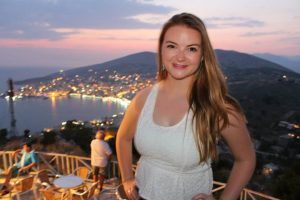
Annie Wright is a Master’s student in the program in Maritime Studies at East Carolina University. She attended Transylvania University in Lexington, Kentucky, where she graduated with a Bachelor of Arts in Anthropology and a minor in Environmental Studies. Annie had the good fortune of working on several underwater archaeology projects in Spain, Honduras, Albania, Croatia, and Montenegro while at Transylvania, as well as spending a semester studying marine resource management in the Turks and Caicos Islands with the School for Field Studies. Her Masters’ thesis research focuses on comparing experimental underwater structured light technology with photogrammetry on a variety of different shipwrecks for 3D printing as a tool to promote cultural heritage tourism. While at ECU, Annie has participated in projects in Florida, Michigan, Costa Rica, and North Carolina. She is an AAUS Scientific Diver and an SDI Open Water Scuba Instructor.
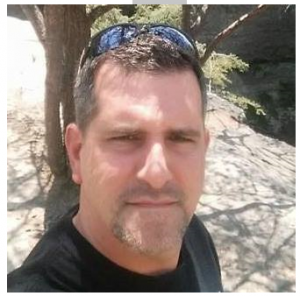 B. Scott Rose is a Master’s Degree candidate studying maritime history and archaeology at East Carolina University. Scott enjoys working in the transition zone between land and sea. His thesis topic is concerned with physical, economic, and cultural change at the Currituck Beach Light Station and surrounding community. Scott has employed drone photography, photogrammetry and computer aided drafting software to create virtual models of the compound. These models have been compared to show the differences between original construction plans and existing architecture. He has also recorded several small boats and artifacts using these techniques.
B. Scott Rose is a Master’s Degree candidate studying maritime history and archaeology at East Carolina University. Scott enjoys working in the transition zone between land and sea. His thesis topic is concerned with physical, economic, and cultural change at the Currituck Beach Light Station and surrounding community. Scott has employed drone photography, photogrammetry and computer aided drafting software to create virtual models of the compound. These models have been compared to show the differences between original construction plans and existing architecture. He has also recorded several small boats and artifacts using these techniques.
